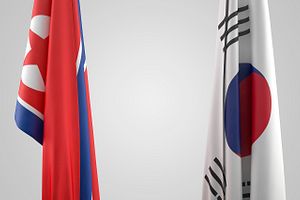The main contenders are set for South Korea’s presidential election, to be held in March 2022. For the Democratic Party, the party of incumbent President Moon Jae-in, the nominee is former Gyeonggi Province Governor Lee Jae-myung; the rival People Power Party (PPP) has tapped former Prosecutor General Yoon Suk-yeol.
Experts predict a close election, as recent polls show that the two parties are neck and neck. However, sentiment about the outgoing president may be just as important as support for the actual nominees. In a recent poll, about 60 percent of people supported a change of regime.
The Diplomat previously analyzed candidate Lee’s foreign policy platform; what would South Korean diplomacy look like under a President Yoon?
“South Korean conservatives generally argue that the Moon administration internationally advocated for engagement based on a fabricated North Korean willingness to denuclearize,” Leif-Eric Easley, associate professor of International Studies at Ewha Womans University in Seoul, told The Diplomat.
“The PPP candidate will likely emphasize strengthening the U.S. alliance, be less muted about the Kim regime’s human rights abuses, and be more vocal about China’s role in North Korean sanctions violations,” Easley said, adding that conservatives have pledged not to offer free concessions or turn the other cheek when Pyongyang launches provocations and insults.
Yoon announced his policies on foreign affairs, including North Korea policies, last month. Surprisingly, he suggested similar policies to those Moon has adopted. Yoon vowed to open trilateral communication hotlines between South Korea, the United States, and North Korea. He also promised to provide unconditional humanitarian assistance to North Korea. To date, this has been the signature North Korea policy of the ruling Democratic Party – and something that conservatives have never supported due to the growing nuclear and missile capabilities of the North.
However, Yoon has also proposed a policy that the ruling Democratic Party would never consider adopting: preparing procedures for deploying U.S. nuclear weapons in South Korea in case of an emergency, and conducting regular operations under this policy to raise confidence in the U.S. nuclear umbrella.
Experts say that this approach is unrealistic, as the United States has no interest in undertaking “nuclear sharing” with South Korea.
“Nuclear sharing and redeployment of tactical nuclear weapons in South Korea is just the nationalist argument of some politicians and scholars who have no deep knowledge on the U.S. administration’s will and background on nuclear policies,” Kim Young-jun, a professor at Korea National Defense University, told The Diplomat. “It’s just political rhetoric for getting more votes, as there is no possibility of U.S. government support for this.”
Some hawkish politicians and right-wing activists have undermined the Moon administration’s overtures to negotiate with Pyongyang, saying that North Korea is not a country but a cartel that consistently violates human rights under the autocratic system centered on ruler Kim Jong Un’s family. However, it’s worth noting that the two conservative administrations before Moon also sought to engage in talks with North Korea under the surface. It did not work out, due to completely different views on the denuclearization process between the two Koreas and the critical military provocations from the North in 2010.
When Moon sat down with Kim in 2018 for three summits, Hong Jun-pyo – then the leader of the main conservative party, and Yoon’s main competition in the close PPP presidential primary race this year – called the inter-Korean meetings “a fake show of peace.” But Moon’s approval rating soared to more than 80 percent in the wake of improving inter-Korean relations, while Hong had to step down from his leadership position after the party was harshly defeated by the ruling Democratic Party in the local elections held two months after the first inter-Korean summit meeting in 2018. Hong and some conservatives criticized the timing of the summit meetings, saying that Moon intentionally tried to hold the meetings to boost his party ahead of local elections.
Along with embracing the more hawkish conservatives’ stance on North Korea, Hong proposed to introduce North Atlantic Treaty Organization (NATO)-style nuclear sharing in South Korea during the presidential primary race. Hong’s views on Moon’s efforts to sit down with Kim might not have represented the mainstream assessment, in general, but the redeployment of tactical nuclear weapons and nuclear sharing under arrangements similar to those used by NATO have steadily been on the conservatives’ table for North Korea policy.
In the same context, experts predict that North Korea would not actively engage in bilateral talks with South Korea should a conservative administration take office next year. That would be nothing new, as Pyongyang has not actively engaged with Seoul under Moon since the U.S.-North Korea summit in 2019 fell apart.
































